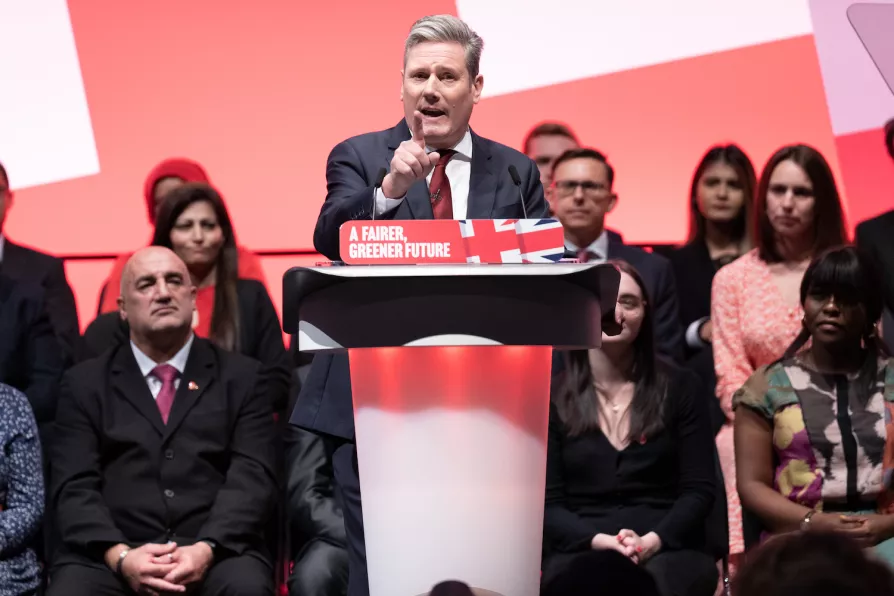
 Labour leader, Sir Keir Starmer delivers his keynote speech to the Labour Party Conference in Liverpool.
Labour leader, Sir Keir Starmer delivers his keynote speech to the Labour Party Conference in Liverpool.
KEIR STARMER looks to Tony Blair in his post-conference interviews, implying Labour is now back where it was in the mid 1990s: purged of leftists and on the cusp of government.
The cost-of-living crisis and a wildly out-of-touch government have led the Labour right to reassess its prospects: from assuming Starmer would be a Kinnock figure, devoted to smashing the left but unlikely to enter Downing Street given the size of the Tory majority, to seeing power as a realistic prospect.
That has also affected trade union calculations, with a notable softening of stances toward Starmer.
Some trade union leaderships are already thinking in terms of “what could a Starmer government offer us” and taking behind-the-scenes promises on repealing the latest Tory anti-union legislation and offers of extra funding for public services as reasons not to publicly confront Starmer on the internal war on the left or the status of Jeremy Corbyn, who is denied the whip by the leader’s personal decree in breach of commitments made to unions which tried to negotiate his return.
There are a number of reasons why it would be a historic mistake to line up behind Starmer and pin our hopes on the election of a Labour government.
For one thing it is far from guaranteed. Labour is riding high in the polls: but that was the case in the second half of 2017 too. An election could be two years away and the Tories may well jettison Liz Truss.
For another, the election of a “New Labour” style government would not resolve much. Tony Blair’s three administrations did nothing to amend the “most restrictive laws on trade unions in the developed world,” as he openly boasted.
Starmer might have promised to repeal the Conservatives’ most recent attacks on union rights and he might keep that promise, though given his record it would be unwise to count on it.
But the Labour Party has not stood with unions during the greatest upsurge in industrial militancy for decades.
Starmer has ordered MPs not to stand on picket lines. Striking Liverpool dockers were collecting for their strike fund outside the conference venue while he was speaking on Tuesday: he made no acknowledgement and offered no support. The contrast to the exiled Corbyn, who addressed them on their picket line on Monday, was stark.
This is in reality an anti-union Labour leadership. It is not an ally.
The Blair governments bear great responsibility for current crises: they began the private-sector infestation that has hollowed out the NHS and they licensed the City speculation that led to the bankers’ crash. More seriously still, they helped the US government set the Middle East alight with devastating wars whose consequences are with us today through the spread of terrorism and the refugee crisis.
Socialists who feel that even Starmer’s limited offer is worth backing because it is better than the Tories’ should realise that even the modest public spending increases of the Blair years cannot be counted on.
Blair took office in a credit-driven boom and at the height of US-led globalisation: the economic landscape is utterly different now. We face a European recession and a world redivided into armed camps.
The range and depth of current crises, from climate chaos to war, make fundamental change a necessity when Labour is committed to maintaining the status quo.
Since the defeat of Corbynism, leadership of the opposition has passed to the unions.
The strike wave and the cost-of-living campaigns are giving working-class people hope for a better future. Their ambition is appropriate and in many workplaces they are winning.
It would be a grave error to temper this ambition and settle for a lesser-of-two-evils Labour government. That would not protect, let alone advance, the cause of labour.

Every Starmer boast about removing asylum-seekers probably wins Reform another seat while Labour loses more voters to Lib Dems, Greens and nationalists than to the far right — the disaster facing Labour is the leadership’s fault, writes DIANE ABBOTT MP

Having endured 14 years of Tory austerity followed by Starmerite cuts, young voters are desperate for change — but Anas Sarwar’s refusal to differentiate from Westminster means Scottish Labour risks electoral catastrophe, writes LAUREN HARPER












